#BJPs
Explore tagged Tumblr posts
Text
take a moment to read indian election news!! india has voted against the ruling fascist party. while they will resume government they will need to forge alliances and have lost multiple strong members of parliament. and all this despite them controlling the media and jailing their opposers! this is SUCH an important reminder that u shld never ever underestimate the power of a vote
#global politics#politics#india#bjp#anti bjp#anti modi#current affairs#indian elections#elections#desiblr#international politics#international affairs#democracy
11K notes
·
View notes
Text
Anupam Hazra removed from the post of BJP's national minister
New Delhi. Bharatiya Janata Party (BJP) national president JP Nadda has removed Anupam Hazra from the post of National Minister. This order of BJP President issued on Tuesday will come into effect with immediate effect. The decision was taken by Home Minister Amit Shah and party president JP Nadda on Tuesday after an organizational meeting in West Bengal. In this core committee meeting, the…
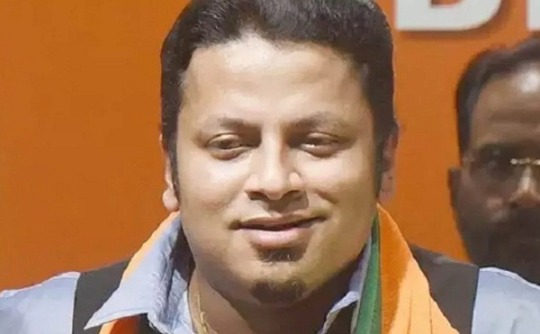
View On WordPress
#Anupam#Anupam Hazra#Anupam Hazra removed from the post of BJP&039;s national minister#BJP#BJPs#Hazra#minister#national#national minister#Post#Removed
0 notes
Text
Indian Army is supposedly using White Phosphorus on civilians in Kashmir - a war crime according to international law.
This is the "Kashmir is healing" that Hindutvadis talk about.
How long do they plan to use the pain of Kashmiri Hindus to justify this occupation?
1K notes
·
View notes
Text
Indian Prime Minister Narendra Modi is, by some measures, the most popular leader in the world. Prior to the 2024 election, his Bharatiya Janata Party (BJP) held an outright majority in the Lok Sabha (India’s Parliament) — one that was widely projected to grow after the vote count. The party regularly boasted that it would win 400 Lok Sabha seats, easily enough to amend India’s constitution along the party's preferred Hindu nationalist lines.
But when the results were announced on Tuesday, the BJP held just 240 seats. They not only underperformed expectations, they actually lost their parliamentary majority. While Modi will remain prime minister, he will do so at the helm of a coalition government — meaning that he will depend on other parties to stay in office, making it harder to continue his ongoing assault on Indian democracy.
So what happened? Why did Indian voters deal a devastating blow to a prime minister who, by all measures, they mostly seem to like?
India is a massive country — the most populous in the world — and one of the most diverse, making its internal politics exceedingly complicated. A definitive assessment of the election would require granular data on voter breakdown across caste, class, linguistic, religious, age, and gender divides. At present, those numbers don’t exist in sufficient detail.
But after looking at the information that is available and speaking with several leading experts on Indian politics, there are at least three conclusions that I’m comfortable drawing.
First, voters punished Modi for putting his Hindu nationalist agenda ahead of fixing India’s unequal economy. Second, Indian voters had some real concerns about the decline of liberal democracy under BJP rule. Third, the opposition parties waged a smart campaign that took advantage of Modi’s vulnerabilities on the economy and democracy.
Understanding these factors isn’t just important for Indians. The country’s election has some universal lessons for how to beat a would-be authoritarian — ones that Americans especially might want to heed heading into its election in November.
-via Vox, June 7, 2024. Article continues below.
A new (and unequal) economy
Modi’s biggest and most surprising losses came in India’s two most populous states: Uttar Pradesh in the north and Maharashtra in the west. Both states had previously been BJP strongholds — places where the party’s core tactic of pitting the Hindu majority against the Muslim minority had seemingly cemented Hindu support for Modi and his allies.
One prominent Indian analyst, Yogendra Yadav, saw the cracks in advance. Swimming against the tide of Indian media, he correctly predicted that the BJP would fall short of a governing majority.
Traveling through the country, but especially rural Uttar Pradesh, he prophesied “the return of normal politics”: that Indian voters were no longer held spellbound by Modi’s charismatic nationalist appeals and were instead starting to worry about the way politics was affecting their lives.
Yadav’s conclusions derived in no small part from hearing voters’ concerns about the economy. The issue wasn’t GDP growth — India’s is the fastest-growing economy in the world — but rather the distribution of growth’s fruits. While some of Modi’s top allies struck it rich, many ordinary Indians suffered. Nearly half of all Indians between 20 and 24 are unemployed; Indian farmers have repeatedly protested Modi policies that they felt hurt their livelihoods.
“Everyone was talking about price rise, unemployment, the state of public services, the plight of farmers, [and] the struggles of labor,” Yadav wrote...
“We know for sure that Modi’s strongman image and brassy self-confidence were not as popular with voters as the BJP assumed,” says Sadanand Dhume, a senior fellow at the American Enterprise Institute who studies India.
The lesson here isn’t that the pocketbook concerns trump identity-based appeals everywhere; recent evidence in wealthier democracies suggests the opposite is true. Rather, it’s that even entrenched reputations of populist leaders are not unshakeable. When they make errors, even some time ago, it’s possible to get voters to remember these mistakes and prioritize them over whatever culture war the populist is peddling at the moment.
Liberalism strikes back
The Indian constitution is a liberal document: It guarantees equality of all citizens and enshrines measures designed to enshrine said equality into law. The signature goal of Modi’s time in power has been to rip this liberal edifice down and replace it with a Hindu nationalist model that pushes non-Hindus to the social margins. In pursuit of this agenda, the BJP has concentrated power in Modi’s hands and undermined key pillars of Indian democracy (like a free press and independent judiciary).
Prior to the election, there was a sense that Indian voters either didn’t much care about the assault on liberal democracy or mostly agreed with it. But the BJP’s surprising underperformance suggests otherwise.
The Hindu, a leading Indian newspaper, published an essential post-election data analysis breaking down what we know about the results. One of the more striking findings is that the opposition parties surged in parliamentary seats reserved for members of “scheduled castes” — the legal term for Dalits, the lowest caste grouping in the Hindu hierarchy.
Caste has long been an essential cleavage in Indian politics, with Dalits typically favoring the left-wing Congress party over the BJP (long seen as an upper-caste party). Under Modi, the BJP had seemingly tamped down on the salience of class by elevating all Hindus — including Dalits — over Muslims. Yet now it’s looking like Dalits were flocking back to Congress and its allies. Why?
According to experts, Dalit voters feared the consequences of a BJP landslide. If Modi’s party achieved its 400-seat target, they’d have more than enough votes to amend India’s constitution. Since the constitution contains several protections designed to promote Dalit equality — including a first-in-the-world affirmative action system — that seemed like a serious threat to the community. It seems, at least based on preliminary data, that they voted accordingly.
The Dalit vote is but one example of the ways in which Modi’s brazen willingness to assail Indian institutions likely alienated voters.
Uttar Pradesh (UP), India’s largest and most electorally important state, was the site of a major BJP anti-Muslim campaign. It unofficially kicked off its campaign in the UP city of Ayodhya earlier this year, during a ceremony celebrating one of Modi’s crowning achievements: the construction of a Hindu temple on the site of a former mosque that had been torn down by Hindu nationalists in 1992.
Yet not only did the BJP lose UP, it specifically lost the constituency — the city of Faizabad — in which the Ayodhya temple is located. It’s as direct an electoral rebuke to BJP ideology as one can imagine.
In Maharashtra, the second largest state, the BJP made a tactical alliance with a local politician, Ajit Pawar, facing serious corruption charges. Voters seemingly punished Modi’s party for turning a blind eye to Pawar’s offenses against the public trust. Across the country, Muslim voters turned out for the opposition to defend their rights against Modi’s attacks.
The global lesson here is clear: Even popular authoritarians can overreach.
By turning “400 seats” into a campaign slogan, an all-but-open signal that he intended to remake the Indian state in his illiberal image, Modi practically rang an alarm bell for constituencies worried about the consequences. So they turned out to stop him en masse.
The BJP’s electoral underperformance is, in no small part, the direct result of their leader’s zealotry going too far.
Return of the Gandhis?
Of course, Modi’s mistakes might not have mattered had his rivals failed to capitalize. The Indian opposition, however, was far more effective than most observers anticipated.
Perhaps most importantly, the many opposition parties coordinated with each other. Forming a united bloc called INDIA (Indian National Developmental Inclusive Alliance), they worked to make sure they weren’t stealing votes from each other in critical constituencies, positioning INDIA coalition candidates to win straight fights against BJP rivals.
The leading party in the opposition bloc — Congress — was also more put together than people thought. Its most prominent leader, Rahul Gandhi, was widely dismissed as a dilettante nepo baby: a pale imitation of his father Rajiv and grandmother Indira, both former Congress prime ministers. Now his critics are rethinking things.
“I owe Rahul Gandhi an apology because I seriously underestimated him,” says Manjari Miller, a senior fellow at the Council on Foreign Relations.
Miller singled out Gandhi’s yatras (marches) across India as a particularly canny tactic. These physically grueling voyages across the length and breadth of India showed that he wasn’t just a privileged son of Indian political royalty, but a politician willing to take risks and meet ordinary Indians where they were. During the yatras, he would meet directly with voters from marginalized groups and rail against Modi’s politics of hate.
“The persona he’s developed — as somebody kind, caring, inclusive, [and] resolute in the face of bullying — has really worked and captured the imagination of younger India,” says Suryanarayan. “If you’ve spent any time on Instagram Reels, [you’ll see] an entire generation now waking up to Rahul Gandhi’s very appealing videos.”
This, too, has a lesson for the rest of the world: Tactical innovation from the opposition matters even in an unfair electoral context.
There is no doubt that, in the past 10 years, the BJP stacked the political deck against its opponents. They consolidated control over large chunks of the national media, changed campaign finance law to favor themselves, suborned the famously independent Indian Electoral Commission, and even intimidated the Supreme Court into letting them get away with it.
The opposition, though, managed to find ways to compete even under unfair circumstances. Strategic coordination between them helped consolidate resources and ameliorate the BJP cash advantage. Direct voter outreach like the yatra helped circumvent BJP dominance in the national media.
To be clear, the opposition still did not win a majority. Modi will have a third term in office, likely thanks in large part to the ways he rigged the system in his favor.
Yet there is no doubt that the opposition deserves to celebrate. Modi’s power has been constrained and the myth of his invincibility wounded, perhaps mortally. Indian voters, like those in Brazil and Poland before them, have dealt a major blow to their homegrown authoritarian faction.
And that is something worth celebrating.
-via Vox, June 7, 2024.
#india#narendra modi#pm modi#modi#bjp#lok sabha elections#rahul gandhi#democracy#2024 elections#authoritarianism#anti authoritarian#good news#hope
747 notes
·
View notes
Text
so far, nearly 3 weeks on from the inauguration of ram mandir, indian authorities have demolished as many masjids and/or madrasas.
30.01.24 - akhoonji masjid & madrasa in delhi, also destroying a cemetery, shrine and all the students’ belongings in the process.
01.02.24 - a madrasa in maharashtra despite facing opposition from local muslims and one day before its scheduled court appeal.
08.02.24 - a masjid & madrasa in uttarakhand. this comes one day after uttarakhand became the first state to pass the uniform civil code (x, x) which aims to apply a ‘hindu code’ to all indians, infringing on the rights of dalits, adivasis, sikhs, christians, buddhists and muslims (i.e. anybody non-hindu) to practice their religion/lifestyle. muslim women protesting the demolition were lathi-charged (beaten with sticks) by police, a shoot-on-sight order was given resulting in 6 muslims killed and 300+ injured in the riots that followed, a curfew was put in place during which hindutva mobs burned down muslim homes and businesses while shouting abuse at muslims.
as always, no prior notice was given and bjp used it’s gold-standard excuse for each demolition, citing ‘illegal encroachment’.
in addition to these masjid demolitions, indian authorities bulldozed 2 neighbourhoods (ghettos, really) in the same timeframe and also without prior notice:
01.02.24 - jasola slum, which, having been around for at least 16 years, should not have been demolished without providing alternative housing, as the delhi slum policy states for slums which came up before 2015. obviously, housing hasn’t been provided.
06.02.24 - panchsheel nagar in mumbai which, having been around since 2011, entitled residents to paid rehabilitation, which has also not been given. this has left over 110 families homeless.
the demographic of both neighbourhoods, surprise surprise, is overwhelmingly muslim, buddhist and dalit.
bjp is enjoying the cover it is receiving from israel’s genocide in palestine to do whatever it wants and is getting bolder by the day. this ‘bulldozer justice’ has been happening for years, but not at such a rapid rate as it is now.
#and bjp’s crimes are always underreported or not reported at all in mainstream news anyway#india#m#!
1K notes
·
View notes
Text

#narendra modi#desiblr#desi humor#desi girl#desi tag#being desi#desi memes#india elections#indian elections#elections#election 2024#bjp#anti bjp#Congress#desi tumblr#lol#.jpg#india news#indpol#indian politics
751 notes
·
View notes
Text
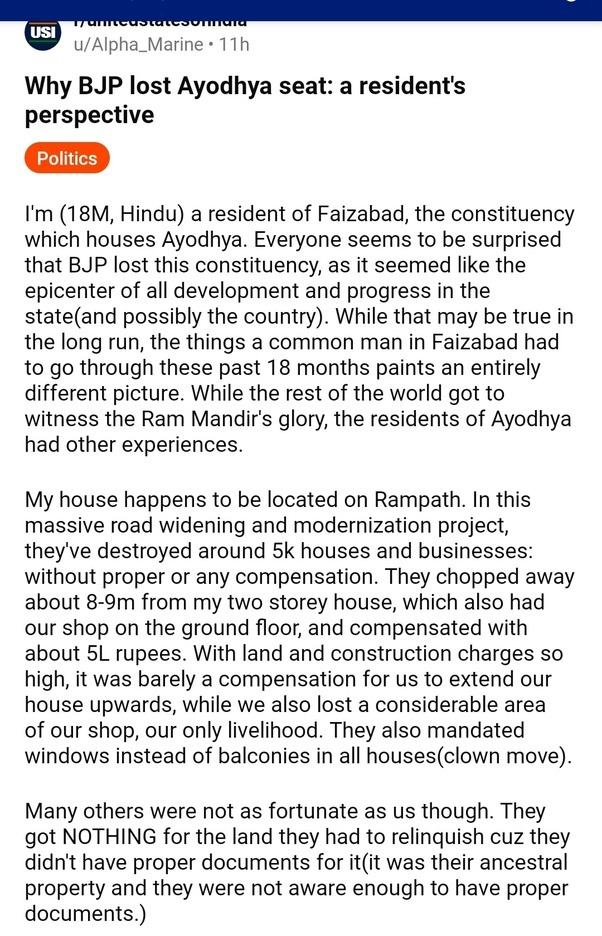
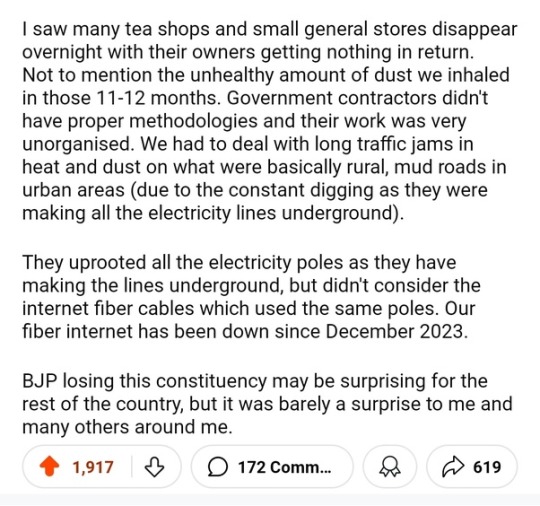
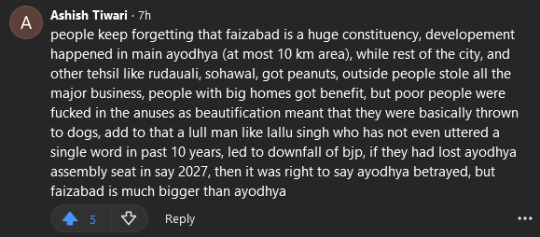
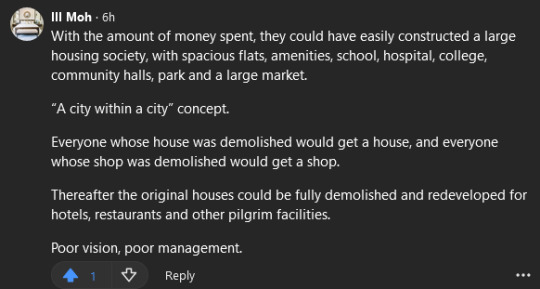
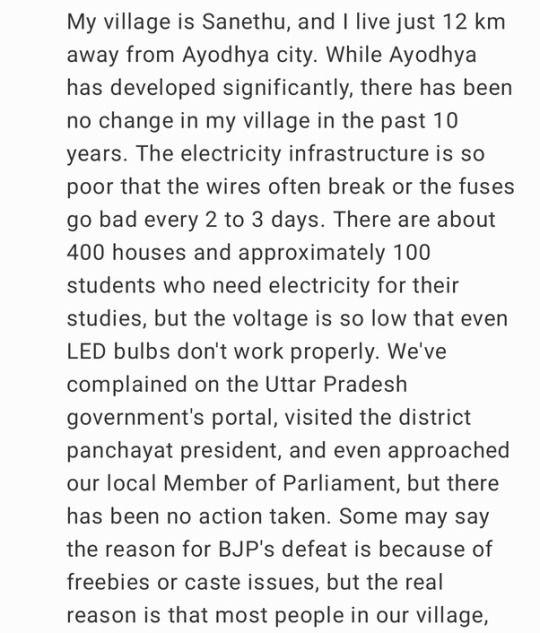
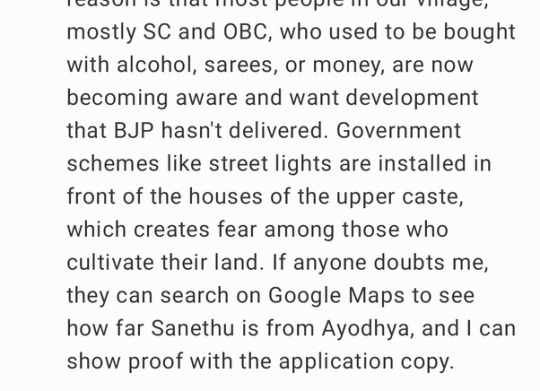

400 notes
·
View notes
Text
It’s vote counting day in india and while it fucking KILLS me to see my country going downhill it’s also fucking HILARIOUS that the BJP is trailing in Ayodhya (as of now) like imagine losing in the place that carried your entire religion based PR 💀💀💀
348 notes
·
View notes
Text
This election has clearly shown one thing: There is a healthy opposition to the ruling party in our country, and it is The People 👏🏻👏🏻
243 notes
·
View notes
Text
does modi know that he needs to kill himself before elections
#trumps bestfriend if we are going to manifest trump's death we need his too#bro last us elections when trump lost bjp bhakts were WAILING
239 notes
·
View notes
Text
So uhh yesterday I had a debate with one of my friends. We were talking about the exit polls and the elections. He's a bjp supporter, I am Congress supporter. I said that to the common man, it doesn't matter which party win, we're still gonna suffer cuz both parties are corrupt. He started saying that BJP isn't corrupt and it's doing so much good for our country. I called bs on this. Brought up Manipur, agniveer, unemployment in UP and MaHa and how the industries are being shifted to gujrat, how poverty increased, the farmer's protests, Kerala MLA's kid, Ramkrishna cafe attack, mujra and mangalsutra too. He didn't respond to any of these, said I've been fooled by the media, that the opposition is brainwashing me. He tried mansplaining too, saying how he wants to help me get better and be educated cuz I'm uneducated rn. How he wants me to be humbled. I also brought up hindutva, how I am deeply terrified of having to leave my country if hindu rashtra is established cuz I am a minority religion. He said I should be grateful that I get privileges (minority religions don't get privileges, castes do btw). He also stated that bjp is doing good for Indian brotherhood and oneness. The irony.
Just thought I'd share this here lmao. Avg bjp antics
223 notes
·
View notes
Text
bro i'm not even Indian but seeing all these desiblr accounts being bjp supporters is disappointing
#my post#desiblr#desi tag#desi tumblr#south asian#desi#anti bjp#anti modi#anti hindutva#india#bjp#they're coming out of the woodworks like crazy
153 notes
·
View notes
Text

Ram ke naam ❤
#ram really said not in my name huhhh#desiblr#indian politics#indian elections#bjp#anti bjp#desi tumblr#yeah tagging it with everything im rubbing it innnn
320 notes
·
View notes
Text
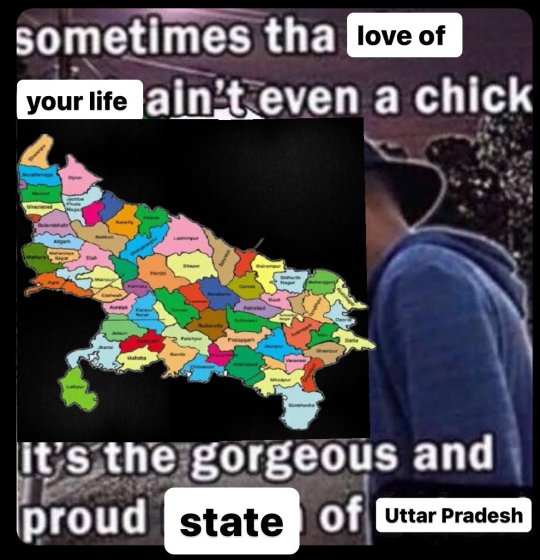
#indian elections#UP#desiblr#desi humor#desipan#desi indian#india elections#bjp#narendra modi#politics#desi tumblr
450 notes
·
View notes
Text
"caste politics won in ayodhya"
stfu and fuck you.
Do not throw around words, not when people can throw it back at you, that most of the urban city seats won by BJP are from the votes of upper caste Hindus.
but I won't go around saying that, because you don't get to decide who votes for who.
Do you believe that a temple is enough to fulfill people's livelihood?
Do not claim to know the condition and needs of Ayodhya better than the people of Ayodhya.
#indian elections#indpol#elections 2024#“caste politics in ayodhya” this statement has me screeching#do not talk like bjp did not fight this election on the basis of religion
142 notes
·
View notes
Text
I FUCKING LOVE THIS SONG


327 notes
·
View notes